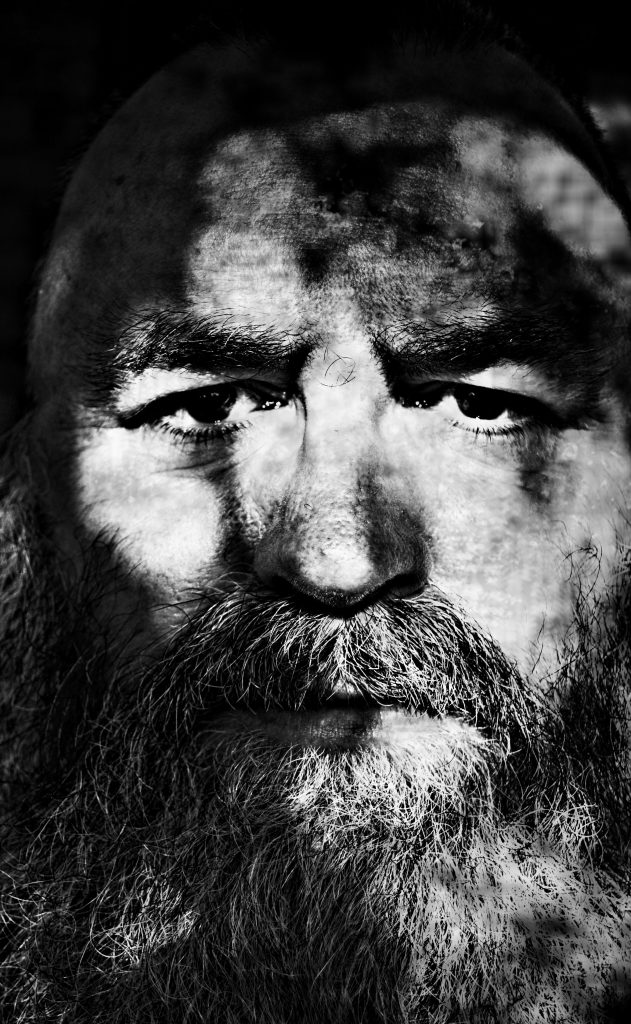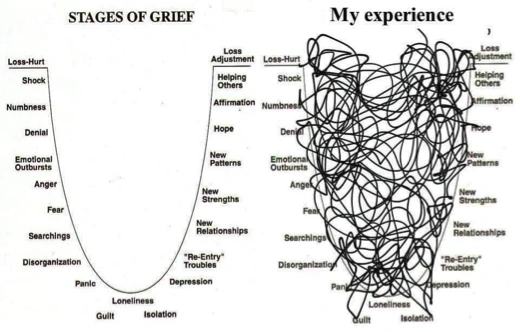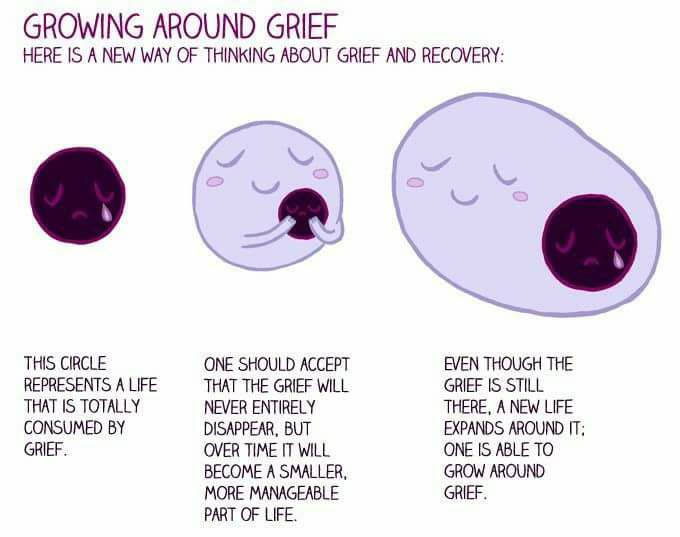Therapist Conal Healy talks about his experience with grief/loss … and how it can destroy lives.

Grief is one of the hardest things I have every encountered. My father’s death – over 25 years ago – was sudden. The grief haunted me for years. It felt as if a huge black hole had formed inside me. It was terrifying to behold – cold and empty.
Over time, the hole would grow smaller but never disappear. Occasionally I would trip … and find myself falling into that hole. The tears would flow and I would climb out, to stumble back to my reality. Until the next time.
***
My late wife, Anna, had her own experience with grief, which haunted her for decades. We never found out if her depression had its roots in the death of her father in the early 1970s.
Anna’s father died when she was 13-year-old and (to me) she seemed never fully got over that loss.
He had died in an industrial accident at the Guinness brewery in Dublin, Ireland. He had died trying to save some of his work mates who were caught in a gas leak. Afterwards he was proclaimed a hero, Anna (and her five siblings) had lost her father, and her mother lost a husband. And the family grieved.
The death of her mother over a decade later probably compounded the grief Anna was suffering. Anna and I had only been married a few months (in 1984) when “rapid cancer” killed Anna’s mother. Again, Anna and her siblings grieved. They were orphans. And grieving.
(Anna managed to exorcise some of those feeling of loss in 2009 when she went to Dublin and saw where he died in the Guinness brewery in Dublin. She returned to Australia and seemed to have laid a few ghosts to rest.)
***
“Can’t people see the pain I’m suffering?”
“Don’t they know how hollow I feel?”
Conal Healy, Grief Survivor
The Irish have death and mourning rituals – sometimes they work, sometimes they don’t.
My older sister went to so many funerals as a child that she swore that she knew the Mass of the Dead off by heart.
Call it a fascination/obsession, the Irish think we know death. We think we can handle death. We can’t.
The words of consolation are as hollow in Ireland as they are here in Australia. They offer little consolation. Or comfort. The big difference between Ireland and Australia is the attitude to death.
In Ireland, we talk about death. We sing and joke about it.
In Australia, death is the ultimate conversation stopper. A real party killer. You can become a pariah by talking about death, and grief.
Few people can relate to grief – until they experience it firsthand.
Until then, the average person doesn’t know how to react/help/cope with somebody who is grieving.
And that can make grief harder to endure.
I was so angry after my father died. I was grieving. And tried to reach out. In vain.
I’d ask myself, “Can’t people see the pain I’m suffering?” “Don’t they know how hollow I feel?”
The answer in a lot of cases is simply No. They don’t. They can’t.
And that is so isolating. Were people building a wall between me and them – to protect themselves? Or are they afraid of me?
In my mind, a lot of Australian aren’t used to strong – raw – emotions, like grief and loss (and love).
***

In some religions a griever is treated as being mad, usually for two weeks.
The Catholic Church suggests a Deep Mourning period for six months, ie you wear black etc. And Lighter Mourning for a further six months. Because they recognize that the person grieving needs to be treated with love and compassion.
It is a Public Display of Mourning.
In Australia, it seems to me, a lot of people think the grief ends with the priest saying: “Go in Peace to love and serve The Lord”. Or it ends when the last person throws the last handful of dirt onto the sealed coffin.
Grievers knows that it doesn’t. It can go on for years.
We also know that it can affect those people around us. Our family and friends – because they cannot sometimes relate to our pain. To our suffering.
***

Grief changes you.
You are no longer the same person – because you have experienced such strong emotions.
Grief can force you to create a new Normal. As a change in the definition of Self.
And let’s be honest, all of this sucks.
In the months after the death of Anna (in June 2016) I learned to control the public display of my array of emotions.
Inside it was different. Inside I am burning, incandescently. And God help anybody who angered me.
At one stage I felt like of those Marvel X-Men character – you know that guy who can shoots laser bolts from his eyes?
As a Public Display of Grief, I stopped going to the barbers to get a hair cut and my beard trimmed. It was a warning to others around me – it was like a poisonous berry that shines Beware Red.
As the months passed, I became hairier and told people I was becoming a Human Hedge.
Like a footnote on an ancient map my appearance was a warning to others: “Beware. Here be monsters.”
I found comfort as a couch potato and lived on a diet of fast food, red wine and bad television.
I had returned to work a few weeks after Anna’s funeral. The daily grind is comforting, but it is not the answer. Meal, work, meal, work, meal, wine, TV bed. Repeat daily.
***
My boss was sympathetic. He had “done grief” – and understood if I took a nap at lunchtime and returned to my computer desk still suffering from “sleep drunk”.
I learned to hold my tongue. I learned to shut up. Slowly I began to realise people didn’t want to hear Anna’s Story, how she had fought cancer, how it changed her and ultimately killed her.
Eventually, work colleagues stopped asking how I was feeling. How could I explain the emotional hurricane that was inside me … in a simple 15-word sentence?
I replied: “I’m surviving”, or “Living one day at time”. Or I’d lie and say: “Yeah … I’m fine”.
My extended family worried about me – they figured I would commit suicide when Anna died, because we were so close. (Anna and I had been a couple from 1978 until 2016.)
I didn’t. I won’t. Because I know there was freedom. There was a new life waiting for me.
I just had to keep going.
– November 2016
Footnote: In March 2022, Conal’s mother died in Dublin, Ireland. He is now an orphan, and grieving.
